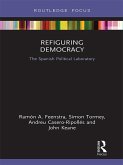-Sidney Tarrow, Cornell University, USA
'Such a book is urgently needed. It lays the foundations for a new "connective social science". The account of the co-evolution between politics and society is not only encompassing, by reflecting the encyclopaedic knowledge of the author, but it is also thrilling in the way it draws on comparative insights from different disciplines and country contexts.'
-Hans-Jörg Trenz, University of Copenhagen, Denmark
'This timely and erudite book masterfully demonstrates that, in order to understand current developments in politics, we must (re)turn to political sociology. It will be extremely valuable to scholars to learn how the discipline has tackled key issues in state-society relations but also grasp contemporary tensions in a globalised era.'
-Virginie Guiraudon, Sciences Po, Paris, France
'The field of political sociology interconnects politics and society in several arenas. This book is unique in identifying these multiple and complex interconnections, describing and examining the key research traditions and presenting them in a clear and systematic manner.'
-Carlo Ruzza, University of Trento, Italy
This textbook presents political sociology as a connective social science that studies political phenomena by creating fruitful connections with other perspectives. The relationship between politics and society is more complex than ever due to the emergence of new power structures, forms of conflict organization and management, and social practices of political participation. Several scholars describe this historical phase as the 'de-politicization of representative politics'. The book addresses classical themes of and approaches to political sociology, but also dedicates several chapters to contemporary developments within political sociology, including, for instance, the role of the internet and bottom-up political communication in social movements. In addition, the volume acts as a professional tool for those scholars and researchers that are beginning to study political processes from a sociological perspective.
Fabio de Nardis is Associate Professor of Political Sociology at the University of Salento, Italy.
Dieser Download kann aus rechtlichen Gründen nur mit Rechnungsadresse in A, B, BG, CY, CZ, D, DK, EW, E, FIN, F, GR, HR, H, IRL, I, LT, L, LR, M, NL, PL, P, R, S, SLO, SK ausgeliefert werden.









